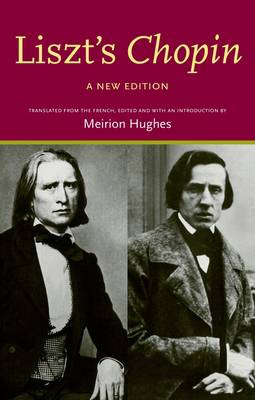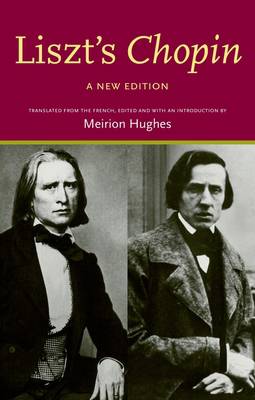
- Afhalen na 1 uur in een winkel met voorraad
- Gratis thuislevering in België vanaf € 30
- Ruim aanbod met 7 miljoen producten
- Afhalen na 1 uur in een winkel met voorraad
- Gratis thuislevering in België vanaf € 30
- Ruim aanbod met 7 miljoen producten
Zoeken
Omschrijving
Passionate and pioneering, Liszt's biography of Chopin flaunts its author's celebrity while straddling the divide between the scholarly and the popular. In this volume Meirion Hughes combines a new translation of the first edition with an introduction that places the work in its cultural and political context. In his introduction Hughes explores the complex relationship between the two composers, the highly charged political context in which the book was written, and the discourse of cultural nationalism and progressivism that dominates content. He argues that Chopin (put in italics) was more than a tribute to an erstwhile friend, but rather a polemic of national music rooted in the politics of that 'year of revolutions', 1848-9. Hughes remains faithful to the original while putting clarity before strict adherence to what is, by general agreement, a quirky text. Controversial in its approach, Liszt's 'Chopin' challenges the long-held view of the memoir is as lightweight, inaccurate portrait of its subject, but rather as one of the most important and daring musical biographies of the nineteenth century.
Specificaties
Betrokkenen
- Auteur(s):
- Uitgeverij:
Inhoud
- Aantal bladzijden:
- 168
- Taal:
- Engels
Eigenschappen
- Productcode (EAN):
- 9780719083518
- Verschijningsdatum:
- 15/10/2010
- Uitvoering:
- Paperback
- Formaat:
- Trade paperback (VS)
- Afmetingen:
- 137 mm x 216 mm
- Gewicht:
- 226 g

Alleen bij Standaard Boekhandel
+ 55 punten op je klantenkaart van Standaard Boekhandel
Beoordelingen
We publiceren alleen reviews die voldoen aan de voorwaarden voor reviews. Bekijk onze voorwaarden voor reviews.











